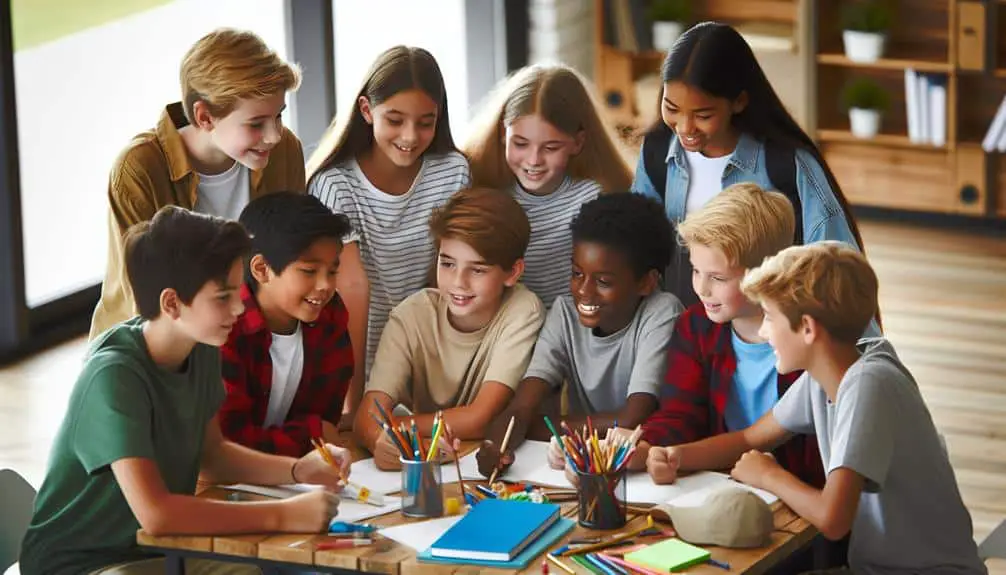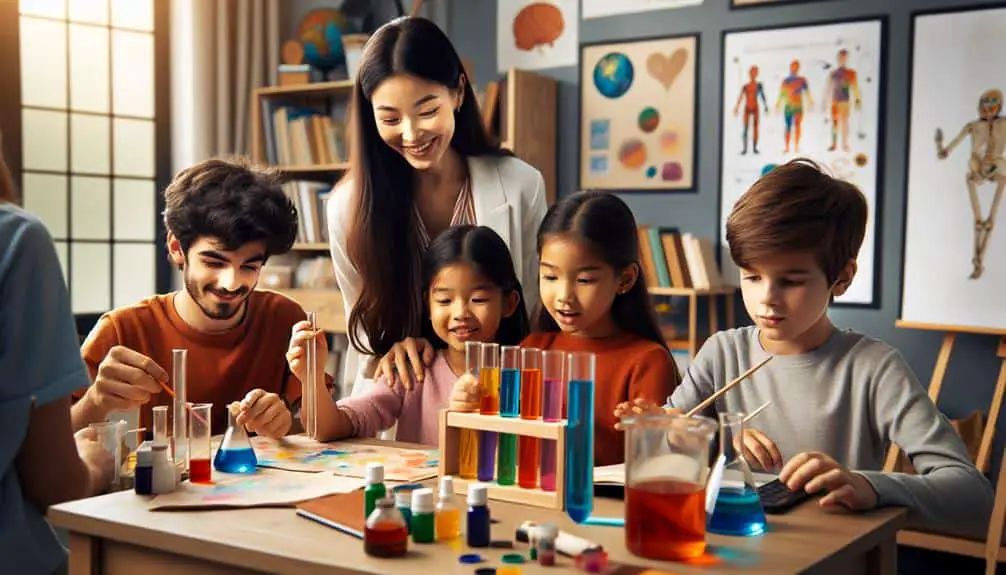To nurture social skills in gifted homeschoolers, focus on understanding their unique social needs. Arrange structured social activities at home like play dates and social clubs. Encourage virtual interactions to develop essential social skills online. Engage in community activities for teamwork and communication enhancement. Foster empathy and emotional intelligence through active listening and emotional awareness. Guide them in building relationships, maintaining connections, and seeking peer interactions. Seek professional guidance for targeted support. Emphasize the importance of holistic development and integration into a supportive community. Your gifted homeschooler's social growth is pivotal for their overall well-being and success.
Key Points
- Engage in structured social activities at home for peer interaction.
- Encourage virtual interactions to develop social skills.
- Participate in community activities for collaboration and empathy.
- Focus on empathy, emotional intelligence, and relationship building.
- Seek professional guidance for targeted social and emotional support.
Understanding Gifted Social Needs
To effectively nurture social skills in gifted homeschoolers, it's essential to first understand the unique social needs that accompany giftedness. Gifted children often have distinct requirements when it comes to forming friendships and their overall social development.
Gifted friendships can be vital for these children as they seek intellectual peers who can engage in deep conversations and understand their advanced interests. These friendships can provide a supportive environment where gifted homeschoolers feel understood and appreciated for their abilities.
Moreover, the social development of gifted homeschoolers may differ from that of their peers due to their heightened sensitivities, asynchronous development, and intense focus on particular areas of interest. Understanding these differences is key to providing appropriate social opportunities and ensuring that gifted homeschoolers can develop strong social skills while embracing their unique characteristics.
Creating Social Opportunities at Home
To foster social skills in gifted homeschoolers, consider incorporating home-based social activities and virtual social interactions into their routine. These opportunities provide a structured yet comfortable setting for them to practice socializing, develop friendships, and enhance their communication skills.
Home-Based Social Activities
Engage your gifted homeschooler in structured social activities within the comfort of your own home to foster their social skills development.
Creating social opportunities at home can be as simple as organizing regular play dates with other homeschooling families or establishing a social club where children can engage in group activities. Play dates offer a relaxed setting for children to interact, share experiences, and develop important social skills like communication and cooperation.
Additionally, social clubs provide a more structured environment for your child to engage with peers, participate in group projects, and learn the dynamics of teamwork. By facilitating these home-based social activities, you can help your gifted homeschooler build confidence in social settings, enhance their ability to navigate social interactions, and foster meaningful friendships.
These interactions at home can serve as a foundation for your child's social development and provide valuable opportunities for them to practice essential social skills in a familiar and supportive environment.
Virtual Social Interactions
Facilitate virtual social interactions at home to provide your gifted homeschooler with opportunities to develop social skills in a digital environment. Virtual playdates and participation in online social clubs can offer valuable experiences for your child to engage with peers in a virtual setting. These interactions can help them practice important social skills such as active listening, turn-taking, and cooperation, all while fostering friendships and a sense of community.
In these virtual environments, it's essential to teach your child about online etiquette and communication skills. Encourage them to communicate clearly, respectfully, and empathetically when interacting with others online. Emphasize the importance of being mindful of tone and intent in written communication, as nuances can sometimes be lost in digital interactions.
Engaging in Community Activities
Participating in community activities can greatly enhance the social development of gifted homeschoolers. Engaging in outdoor adventures and community service provides valuable opportunities for these children to interact with peers and develop essential social skills.
Here are some ways community activities can benefit gifted homeschoolers:
- Team Building: Engaging in group activities fosters teamwork and collaboration skills.
- Communication Skills: Interacting with a diverse group of individuals helps in improving communication abilities.
- Empathy Development: Participating in community service activities cultivates empathy and compassion towards others.
- Conflict Resolution: In community settings, gifted homeschoolers learn to navigate conflicts and find solutions amicably.
Developing Empathy and Emotional Intelligence
To nurture empathy and emotional intelligence in gifted homeschoolers, it's essential to focus on developing skills such as empathy in communication, understanding emotions, and building relationships.
By emphasizing the importance of empathy in interactions, gifted children can learn to connect with others on a deeper level and show compassion towards different perspectives.
Understanding emotions and building relationships are essential components that contribute to the overall social growth and well-being of gifted homeschoolers.
Empathy in Communication
How can nurturing empathy in communication contribute to the development of emotional intelligence in gifted homeschoolers?
Empathy in communication plays an essential role in enhancing emotional intelligence. By fostering empathy, gifted homeschoolers can better understand and connect with others' emotions, leading to improved social interactions and relationships.
Here are some key ways empathy in communication can aid in developing emotional intelligence:
- Active Listening: Engaging in active listening allows gifted homeschoolers to fully comprehend others' perspectives and emotions, fostering empathy and understanding.
- Emotional Validation: Validating others' emotions shows empathy and helps in building trust and rapport with peers and family members.
- Perspective Taking: Encouraging gifted homeschoolers to contemplate different viewpoints helps broaden their understanding of emotions and enhances their emotional intelligence.
- Compassionate Responses: Responding to others with compassion and kindness nurtures empathy and promotes positive emotional interactions.
Understanding Emotions
Understanding emotions is an essential aspect of developing empathy and emotional intelligence in gifted homeschoolers. Emotional awareness, the ability to recognize and understand one's own emotions and those of others, plays a significant role in fostering empathy. Gifted homeschoolers can benefit greatly from developing emotional intelligence, which includes skills like self-regulation – the ability to manage and control one's emotions effectively.
By honing emotional awareness, gifted homeschoolers can better navigate social interactions, understand the perspectives of others, and respond empathetically to different situations. Developing self-regulation skills allows them to regulate their emotional responses, leading to more constructive communication and healthier relationships.
Research shows that individuals with high emotional intelligence tend to have stronger interpersonal relationships, exhibit greater empathy, and are better equipped to handle conflicts. Encouraging gifted homeschoolers to cultivate emotional awareness and self-regulation can enhance their social skills and overall emotional well-being, preparing them for success in various personal and professional settings.
Building Relationships
Developing empathy and emotional intelligence is pivotal for gifted homeschoolers in building strong and meaningful relationships. Gifted individuals often excel academically but may struggle with social interactions.
To foster healthy relationships, consider the following:
- Friendship Building: Encourage your child to engage in activities where they can meet like-minded peers, such as clubs or classes tailored to their interests.
- Social Skills Development: Practice active listening, perspective-taking, and conflict resolution with your child to enhance their social skills.
- Relationship Building: Help your child understand the importance of reciprocity in relationships and how to maintain a balance between giving and receiving support.
- Connection Maintenance: Teach your child the value of staying in touch with friends and loved ones, whether through regular communication or planning activities together.
Encouraging Peer Interactions
To foster healthy social development in gifted homeschoolers, actively facilitating opportunities for peer interactions is essential. Playdates, group activities, social clubs, and team sports are effective ways to encourage gifted children to engage with their peers.
Playdates provide a casual setting for children to interact one-on-one, fostering friendships and social skills. Group activities, such as art classes or science clubs, allow gifted homeschoolers to collaborate with peers who share similar interests, promoting teamwork and communication.
Social clubs can offer a structured environment where gifted children can meet regularly with a specific focus, like coding or drama, providing a sense of community and belonging. Additionally, team sports not only promote physical health but also teach important social skills like cooperation, leadership, and sportsmanship.
Seeking Professional Guidance
Professional guidance is instrumental in supporting the social and emotional development of gifted homeschoolers. Seeking therapist support or counseling services can provide invaluable assistance in addressing specific social or emotional challenges that gifted children may face. Additionally, social skills coaching can offer tailored strategies to help homeschoolers navigate social interactions effectively.
When it comes to seeking professional advice for your gifted homeschooler, consider the following:
- Therapist Support: Engaging with a therapist who specializes in working with gifted individuals can offer targeted support for emotional well-being.
- Counseling Services: Professional counseling services can help in developing coping mechanisms and enhancing social skills.
- Social Skills Coaching: Working with a social skills coach can provide practical strategies for improving communication and building relationships.
- Professional Advice: Seeking guidance from professionals who understand the unique needs of gifted children can offer valuable insights and support.
Frequently Asked Questions
To help your gifted homeschooler navigate friendships outside, consider enrolling in social clubs, joining support groups, arranging playdates, and attending community events. These activities provide opportunities for interaction, fostering valuable social skills development.
Are There Specific Strategies to Prevent Social Isolation in Gifted Children?
To prevent social isolation in gifted children, encourage involvement in social clubs for shared interests and collaborative group projects. These activities foster connections, teamwork, and communication skills essential for meaningful interactions outside the home.
What Role Do Extracurricular Activities Play in Developing Social Skills?
You might think extracurricular activities are just for fun, but they're essential for social development. Engaging in group activities like sports or clubs helps gifted homeschoolers build friendships, teamwork skills, and confidence.
How Can I Address Social Anxiety in My Gifted Homeschooler?
To help your gifted homeschooler with social anxiety, provide social anxiety support through understanding their triggers. Teach coping strategies like deep breathing. Stay involved as a parent, seek professional guidance when needed for effective intervention.
Are There Any Online Resources for Connecting With Other Gifted Homeschoolers?
You can find online communities and virtual meetups tailored for connecting with other gifted homeschoolers. These platforms offer a supportive environment for sharing experiences, resources, and building relationships with like-minded individuals in the homeschooling community.



